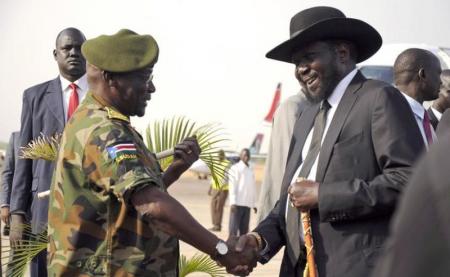The president of South Sudan has replaced army chief Paul Malong with a general who is a member of an ethnic minority, the defence minister said on Tuesday, after a slew of resignations by senior generals alleging tribal bias and war crimes.
President Salva Kiir has appointed General James Ajongo as the new army chief, said Minister of Defence Kuol Manyang Juuk. He played down the significance of Malong’s removal, calling it “just a normal practice of changing somebody and bringing (in) another person.”
Malong was told one month ago that he would be relieved, Juuk told Reuters. He did not know if Malong, a former elected civilian governor, had been given a new appointment.
Juuk said the change would not affect the military’s fight against rebel groups. “The operation will go on,” he said.
South Sudan, the world’s youngest nation, has been mired in civil war since 2013 when Kiir, an ethnic Dinka, fired his deputy, Riek Machar, a Nuer.
The move triggered a conflict that has plunged parts of the oil-producing country into famine, paralysed public services and forced 3 million people – a quarter of the population – to flee their homes. The United Nations has said the violence amounts to ethnic cleansing and risks setting the stage for genocide.
In February, the military’s head of logistics, Thomas Cirillo Swaka, resigned, citing rampant human rights abuses by the military and the dominance of the president’s Dinka ethnic group. His announcement brought a wave of other resignations by generals and civil servants who made similar accusations against the government.
Both Kiir and Malong are from the Dinka community, but Ajongo is a Luo from Aweil, in the northwest of the country, according to Kiir’s spokesman, Ateny Wek Ateny.
Ateny said Ajongo joined the Sudan People’s Liberation Army, the formal name of the South Sudanese military, in 1983, when it was still a rebel group fighting for independence from neighbouring Sudan.
“He’s a military career person,” Ateny said. He denied there was any split between Malong and Kiir. “This has nothing to do with political or any rumour-mongering,” he said. “There is no division in the government.”
A spokesman for Machar’s rebels said that Malong would remain a powerful force in the civil war because of his role recruiting Dinka tribal militias.
“There will still be the presence of Mathiang Anyor and other militias in the country,” spokesman Lam Paul Gabriel said. Mathiang Anyor is a common term for irregular Dinka militia.
“His work will still be continued by his followers and recruits. Mathiang Anyor does not listen to anyone but General Paul Malong. He will still control them,” Gabriel said. “We will still have a war to fight, maybe even more than now.”
Kiir’s government has denied any involvement in recruiting Dinka irregulars.
Source: Reuters



